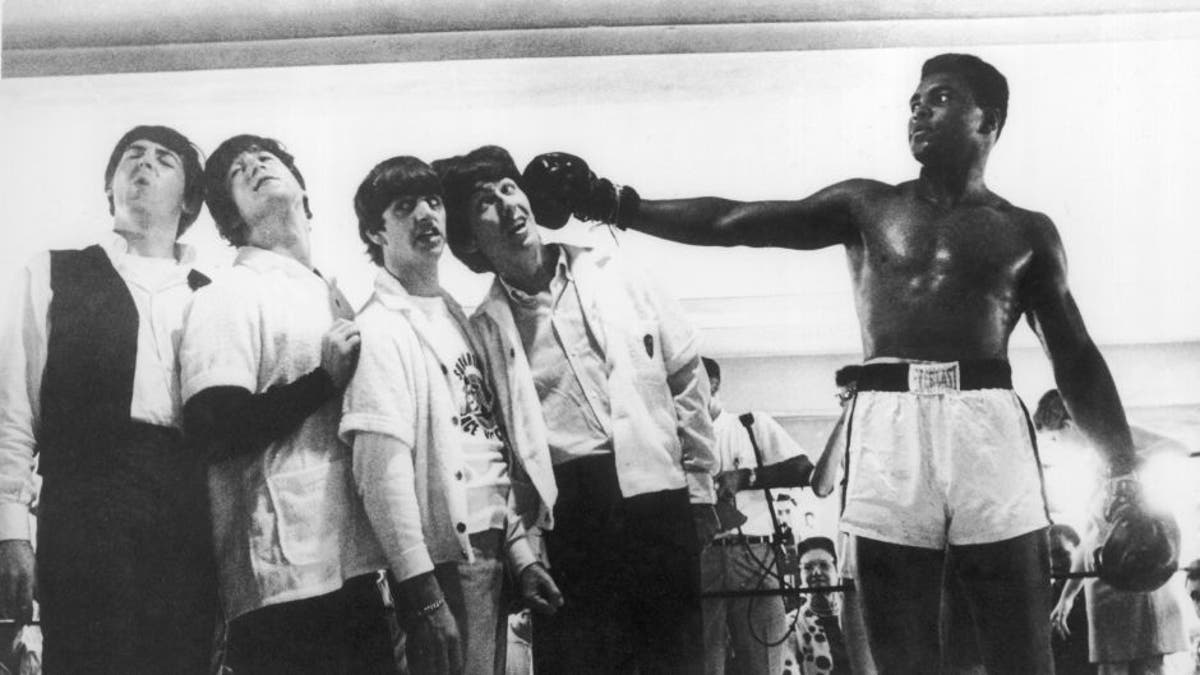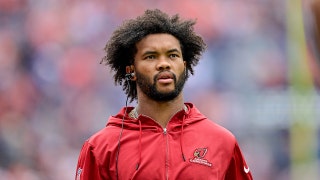
UNITED STATES - APRIL 22: During a visit to the training room of the boxer in Miami, the BEATLES were acting as they were knocked out by the American boxer Muhammad ALI, became recently boxe World Champion. (Photo by Keystone-France/Gamma-Keystone via Getty Images)
Muhammad Ali died this weekend at 74. Given Ali's fascinating life, we present a list that mixes the frivolous with the pioneering. As it's impossible to compare such things, these moments are presented in no particular order. (For a list of Ali's 10 greatest boxing moments, click here.)
1. Ali lights the Olympic cauldron
It's a remember-where-you-were moment. American swimming legend, Janet Evans, who knew she'd be the second-to-last torchbearer for weeks but only found out who she'd be passing to 24 hours before, climbed a three-story ramp in Atlanta's Olympic Stadium at the conclusion of the 1996 Opening Ceremony. There, she passed it off to the surprise final torchbearer, the gold medalist from the 1960 Rome Games of 36 years before. Ali, shaking from the Parkinson's, struggled to get the torch to ignite the apparatus that would shoot up the cauldron. But then, the Greatest got his hand to stop shaking, if only for an instant, as he steadied the torch to light the Olympic cauldron, one last bit of showmanship from the greatest entertainer sports had ever seen.
2. The conscientious objector
"I ain't got no quarrel with those Vietcong," Ali famously said after he refused to step forward at a military processing center in 1967, effectively refusing entry into the draft and asking for his status to be changed due to the non-violent practices of his Muslim beliefs. He was soon arrested, convicted, sentenced to five years in prison and banned from boxing. "I had to prove you could be a new kind of black man," Ali said. "I had to show that to the world." Through the next three years, as his titles were stripped and redistributed, Ali held firm until the Supreme Court overturned his conviction in 1971. One year before, however, he'd been allowed back in the ring where he fought the No. 1 challenger Jerry Quarry. Rust? What rust? After the third round, officials would stop the fight. Ali was back.
3. Howard Cosell
Theirs was a symbiotic relationship. Ali, who'd studied the famous wrestler Gorgeous George and adopted his hype moves, needed a forum for his charisma. Cosell, who thought of himself as an intellectual stuck covering sports, needed a verbal sparring partner. It was a perfect match: "You're being extremely truculent," Cosell told a braggadocios Ali during one interview. Ali didn't miss a beat. "Whatever truculent means, if that's good, I'm that." Cosell was one of the first in the media to call Clay by his new name (the New York Times wouldn't do that for nearly three years) and supported his objection to being drafted. They'll always be bound together in history.
4. Ali joins the Nation of Islam
Cassius Clay upset Sonny Liston on a Tuesday. By Thursday he was a member of the Nation of Islam and would henceforth be known as Cassius X. It wasn't as much a conversion to the Islamic faith as to the group led by Elijah Muhammad and pushed forward by Malcolm X. It was an unpopular move in most communities. "When Cassius Clay joined the Black Muslims and started calling himself Cassius X," Martin Luther King said, "he became the champion of racial segregationâand that is what we are fighting." And even Malcolm X was chagrined, as he felt like he'd been pushed out of Muhammad's favor for the boxer. He'd soon renounce the NOI and one year later he was dead, felled by the hands of three Nation of Islam assassins. Ali would say his fallout with Malcolm X was the great regret of his life. Later, Ali would renounce the violence of Muhammad's group to embrace a more compassionate form of Islam.
5. Cassius meets the Beatles
The greatest band met the greatest at a hastily arranged meeting the week of the first Sonny Liston fight, just after the Beatles had performed on Ed Sullivan. (Liston, who had attended, was left unimpressed, particularly by the drummer with "the big nose.") The moptops from Liverpool were a better match with the verbose Clay and they had a quick rapport, even though John Lennon had originally said the band wanted nothing to do with "that loudmouth who's going to lose.". After some photo ops and an orchestrated back and forth, Clay looked at John Lennon and said, "you're not as stupid as you look." Lennon flashed a smile. "No, but you are."
6. The inspiration for the greatest sportswriting ever
Take your pick as to which literary great wrote the best on Ali. Plimpton. Liebilng. Mailer. Remnick. For my money, I'll take Norman Mailer's The Fight, a comic, biographical look at the Rumble in the Jungle, a match with an end that only Mailer could describe:
"With 20 seconds left to the round, Ali attacked. By his own measure, by that measure of 20 years of boxing, with the knowledge of all he had learned of what could and could not be done at any instant in the ring, he chose this as the occasion and lying on the ropes, he his Foreman with a left and a right. [...] Foremans' arms flew out to the side like a man with a parachute jumping out of a plane, and in this doubled-over position he tried to wander out toe the center of the ring. All the while his eyes were on Ali and he looked up with no anger as if Ali, indeed, was the man he knew best in the world and would see him on his dying day. Vertigo took George Foreman and revolved him. [...] He went over like a six-foot, 60-year-old butler who has just heard tragic news, yes, fell over all of a long collapsing two seconds, down came the Champion in sections and Ali revolved with him in a close circle,, hand primed to hit him one more time, and never the ned, a wholly intimate escort to the floor."
7. Ali sings!
Tacked on the end of his 1963 spoken-word album I Am the Greatest, Ali had a cover of Ben E. King's Stand By Me. While it has the distinct pitch and cocksureness of Ali's famed timber, it's also a pretty bad cover, interesting more for the man singing rather than the words coming out. Note that in the days before AutoTune there was a good way to keep singers from hitting flat notes: just turn their levels way, way down.
8. The poet
The Louisville Lip was a nickname surely earned well before Ali's boxing career began. His famous rhymes started as early as those 1960 Olympics and made their worldwide debut before Ali's first title fight with Liston. Throughout the years he'd create dozens of stanzas of rhymes, though his best might have come in Zaire, before the Rumble in the Jungle:
"You think the world was shocked when Nixon resigned?
Wait 'til I whup George Foreman's behind.
Float like a butterfly, sting like a bee.
His hand can't hit what his eyes can't see.
Now you see me, now you don't.
George thinks he will, but I know he won't.
I done wrassled with an alligator, I done tussled with a whale.
Only last week I murdered a rock, injured a stone, hospitalized a brick.
I'm so mean, I make medicine sick."
Muhammad Ali: The first rapper?
9. The red Schwinn
A 12-year-old Cassius had ridden his bike to downtown Louisville for an expo (he wanted the free candy they were handing out) and when he returned outside, the red Schwinn, his prized possession, was gone. Furious and wanting to fight whoever took it, the young Clay was told to seek out a police officer who was working in the basement. That police officer - Joe Martin - calmed Clay down and told him that the best way to fight was by learning how to box. The rest was history.








































